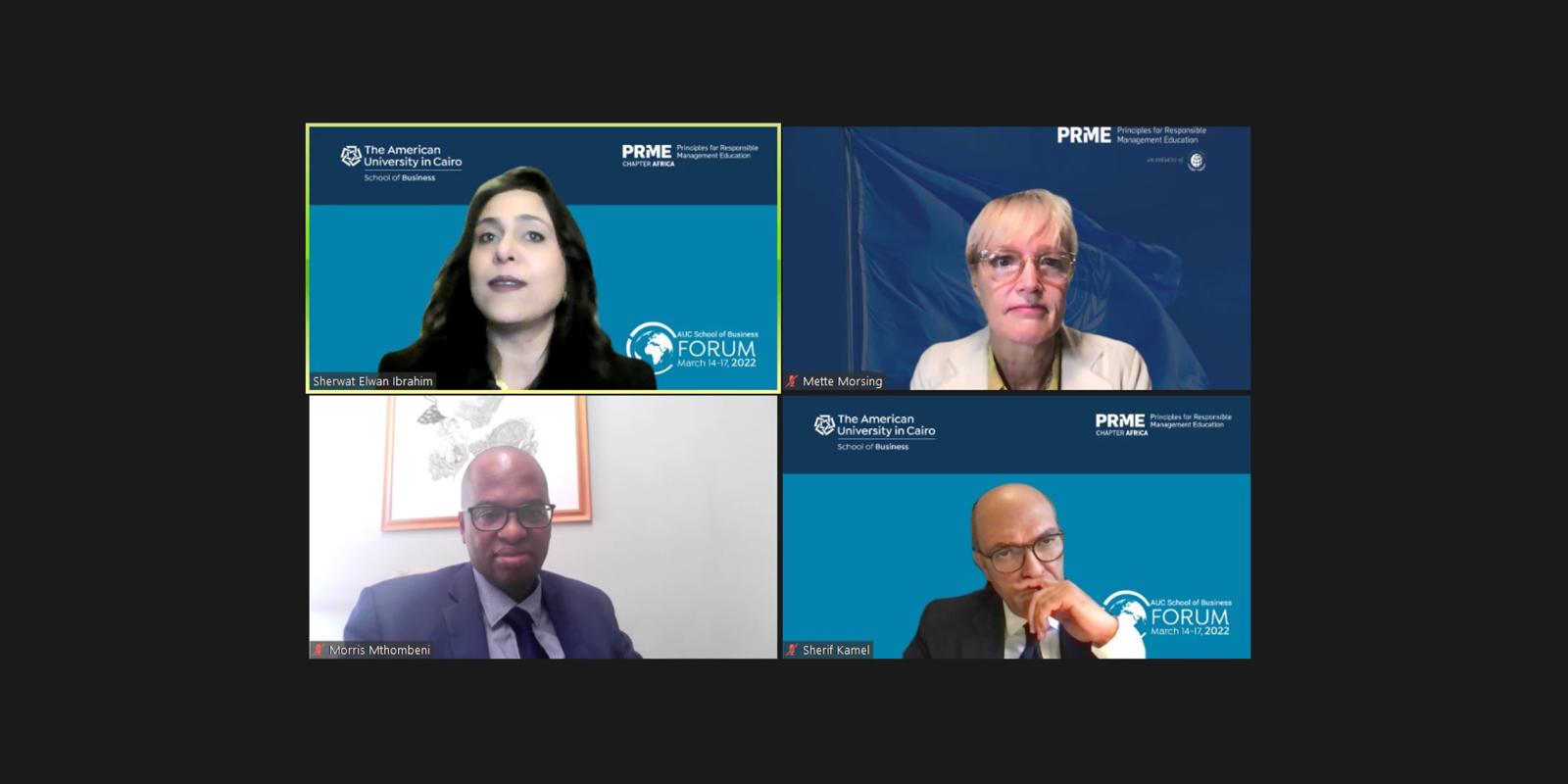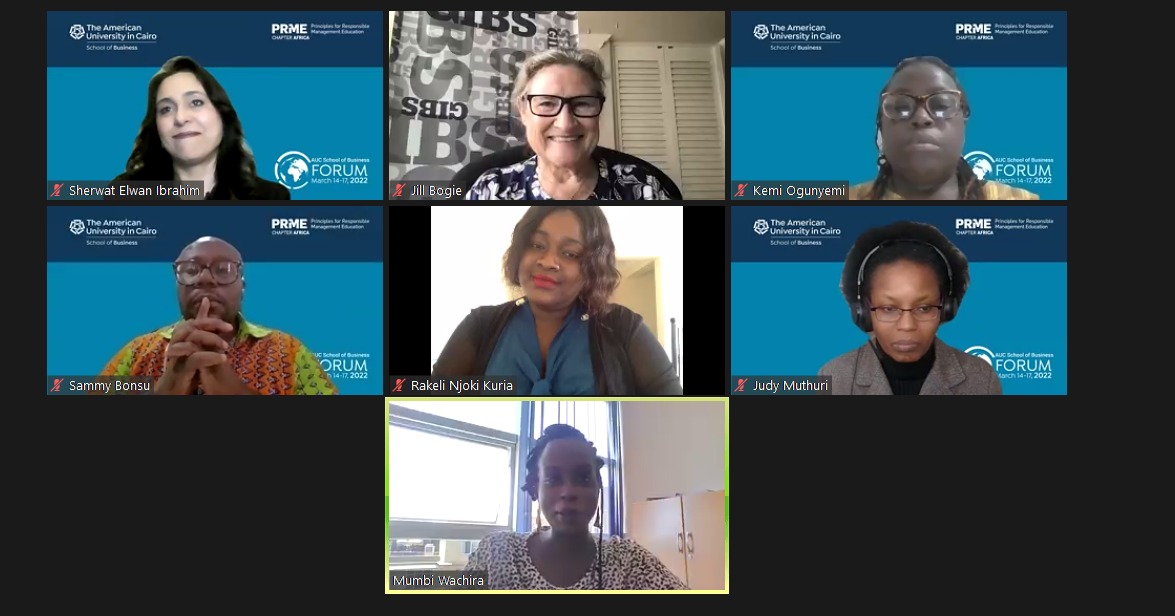
Launching the United Nations Global Compact’s Principles for Responsible Management Education (PRME) Chapter Africa
In 2007 the Principles for Responsible Management Education (PRME) was launched by the United Nations Global Compact. It has, over the years, become the most prominent, well-established bridging entity between the United Nations and business schools around the world. PRME’s main goal is to promote a culture of sustainability and the embodiment of the UN’s Sustainable Development Goals in business and management-related educational institutions. This is an effort to produce a caliber of younger leaders from around the world who value and uphold a sustainability-oriented mindset, aiding them in ushering in a new wave of sustainable business practices into the corporate world.
On March 15, 2022, during the third roundtable of the 2022 AUC Business Forum, the launch of the PRME Chapter Africa was announced. The chapter aims to further advance PRME’s missions in the African continent on a more local and regional level in terms of collaborating with business schools in Africa to encourage an increased emphasis on responsible management education in academia. PRME Chapter Africa is currently the newest of the 15 PRME chapters around the world.
The third roundtable was moderated by Sherwet Elwan Ibrahim, associate professor and director of the MBA and Executive MBA Programs at the AUC School of Business and the vice chair of PRME Chapter Africa’s Founding Committee. A welcome note was given by Dean of AUC School of Business, Sherif Kamel, followed by some opening remarks on the launch by speakers Mette Morsing, head PRME secretariat, and Morris Mthombeni, board member of the PRME Global Chapter Council. Thereafter, the roundtable featured an esteemed group of experts from a diverse array of African countries.
PRME Chapter Africa’s alignment with the School’s principles
During the launch event, Dean Kamel highlighted the school’s shift towards a more sustainable and responsible business orientation by stating that “in 2009, we restructured the School to be centered around three major themes, namely entrepreneurship, responsible business, and economic development. These elements have been guiding our strategic directions and priorities over the past decade.” He further added: “This is why, as you can imagine, our teaching, research, and services offered for the AUC community uphold those three elements that include responsible business.”
Furthermore, Kamel also underscored the longstanding partnership of the School with PRME. “We have had a long history with PRME which dates back to October 2011, when the School hosted the first PRME MENA regional forum. This forum was well-attended and kick-started our collaboration with PRME, mainly through the John D. Gerhart Center for Philanthropy, Civic Engagement and Responsible Business, the main developmental arm of the School,” emphasized Kamel.
Fostering sustainability-oriented mindsets
Morsing illustrated what she believed should be the three main aspects – the so-called “three S’s” – that should be considered when planning for the future of PRME and its community. “The first is “society”. We need to create business students with the kind of mindset that puts society at the center of the stakeholder model rather than the corporation,” explained Morsing.
The second is “success”. Morsing highlighted that “When I observe many of the strategy textbooks that I own, I find that the language used is very attack-based and ‘winning’ oriented. We should change this language to a more co-creational oriented one that creates a different more partnership-inclined mindset within business students.”
In addition, Mthombeni also elaborated on this point by mentioning that “business schools have been built on the notion of competition. However, I believe they should be focused more on justice and inclusivity, and try to replace this notion of competition with one of collaboration.” He reasserted: “All business schools in the continent need to view each other as collaborators rather than competitors.”
The last is “skill sets”, as Morsing explained: “It’s the responsibility of educators to develop skill sets in students to solve business problems and address them, not only from a financial point of view, but also considering other factors such as which investments are considered green or can improve human rights.”

Aims of PRME Chapter Africa
Sammy Bonsu, chair of PRME Chapter Africa’s Founding Committee and director of the Ghana Institute of Management and Public Administration illustrated some of the main goals of creating PRME Chapter Africa. “One of our main goals was to develop a governance structure and a scheme based on specific guiding principles [of sustainability and collaboration] which we hope to entrench into and throughout the African continent,” he stated, adding: “We were also trying to establish strategic relationships.”
Noting the need for collaboration, Ibrahim stated: “One of the strategic priorities of the chapter is establishing closer links with PRME UN Global Compact’s local networks in different regions across the continent and to provide support for these networks in terms of driving ambition and action towards the UN’s SDGs.” She further elaborated: “We [referring to PRME Chapter Africa] have many ideas on how to engage in joint activities with students and promote sustainability-related dialogues between business leaders and academia.”
In short, the Chapter’s mission coincides with the School’s goals and priorities which entails producing sustainably conscious market leaders. Furthermore, the Chapter aims to instill the SDGs into businesses’ operation and decision-making all over the continent and help provide African-based businesses with the assistance and infrastructure to do so.
Click here to watch the full roundtable.
